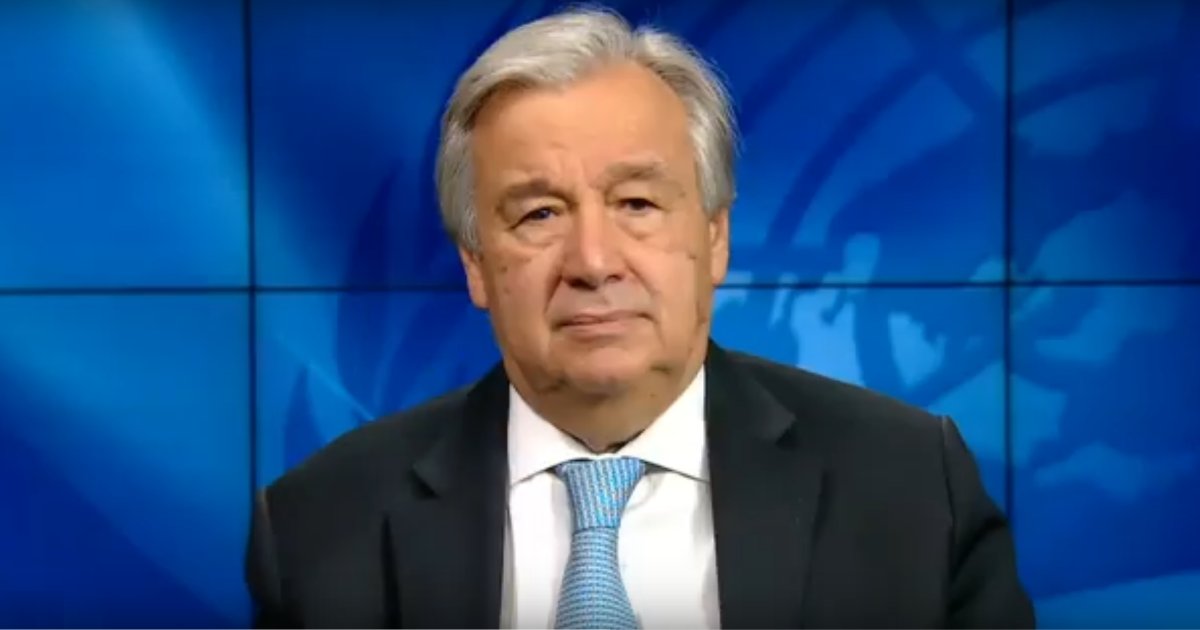
UN Secretary-General António Guterres has urged members of the Coalition of Finance Ministers for Climate Action to keep pushing for a green COVID-19 recovery.
The Coalition, which was launched last year, is comprised of fiscal and economic policymakers from 52 countries striving to integrate climate change issues in their respective economic and financial policies. The group serves as a forum to promote the Helsinki Principles and facilitates exchange of experience and information. Member countries represented approximately 16% of global carbon dioxide emissions and 30% of global GDP in 2017.
It probably won’t come as a shock that Australia isn’t a member country of the Coalition.
In his video message to members who gathered virtually on Monday for the Coalition’s Fourth Ministerial Meeting, the Secretary- General said governments need to align their COVID recovery and stimulus plans with Paris Agreement goals.
“That means investing in green and decent jobs. Do not bail out polluting industries. End fossil-fuel subsidies. And take climate risks into account in all financial and policy decisions.”
This isn’t a new message from Secretary-General Guterres. Last year when he called for an end to fossil fuel subsidies, he also commented that taxes should be shifted from salaries to carbon.
“Tax pollution, not people,” he stated.
In his video address, Secretary- General Guterres said all Coalition member countries need to send a “clear and unambiguous” signal to markets that decarbonisation of the global economy was inevitable and to commit to achieving carbon neutrality by 2050.
COVID-19 A “Dress Rehearsal”
It’s quite insane that as part of recovery from the damage the coronavirus has and is continuing to wreak that countries should turn to something that has been and will be responsible for even greater economic damage and the deaths of millions more – fossil fuels.
Last month, OECD Secretary-General Angel Gurría expressed concern that the overall balance between green and non-green spending in COVID-19 recovery wasn’t encouraging at that point. He noted “green” sectors and related activities offer substantial opportunities for job creation; mentioning solar power employs more people per unit of investment and energy than fossil fuel-based generation.
Secretary- General Guterres stressed coal should not be part of any COVID-19 recovery plans and warned the COVID crisis was a “dress rehearsal” for the even greater climate emergency faced by all nations.
” We need speed, scale, and decisive leadership. I count on this coalition to rise to the challenge.”
Here’s Secretary- General Guterres’s full address:

 RSS - Posts
RSS - Posts



The post includes:
“In his video message to members who gathered virtually on Monday for the Coalition’s Fourth Ministerial Meeting, the Secretary- General said governments need to align their COVID recovery and stimulus plans with Paris Agreement goals.”
I’d suggest we all need to get our skates on.
Published yesterday morning was an op-ed headlined “What must climate and energy policy really achieve?” by Ian Dunlop and David Spratt. It included:
“In summary, the lower 1.5°C temperature increase limit of the Paris Climate Agreement will occur around 2030, a decade ahead of official projections. The 2°C upper limit is likely to be reached before 2050, even with actions better than the current Paris commitments. 3°C would be reached early-to-mid second half of the century on the current global emissions trajectory, with 5°C possible before 2100. Our Faustian bargain is that for the next two decades, lower emissions will have little impact on the warming trend. For a by-product of burning fossil fuels are sulfate aerosols which have a strong cooling effect that has been masking some of the warming to date. Declining fossil fuel use and clean air policies will reduce this cooling, thus offsetting for a time the impact of emission reductions.
The current 1.2°C of warming is already dangerous; 2°C would be extremely dangerous; 3°C catastrophic; and 4°C unliveable for most people. An even greater danger is that “Hothouse Earth”, irreversible, self-sustaining warming may be triggered between 1.5–2°C. There is a risk that we have already lost the ability to prevent such warming.
The world must face these risks with brutal honesty, not in the alarmist sense, but recognising that their sensible management requires emergency action. NZE2050 would be a recipe for disaster; net zero emissions must be achieved as soon as possible, ideally by 2030 (NZE2030). In addition, atmospheric carbon concentrations must be reduced substantially from current levels, albeit drawdown techniques are embryonic. Finally, if political aversion to emergency action continues, the use of geoengineering techniques, such as solar radiation management, to buy time cooling the planet before emission reductions take effect, must be seriously considered if they are shown to be of net benefit.”
See: https://johnmenadue.com/what-must-climate-and-energy-policy-really-achieve/
Their post includes a link to their latest report titled “Climate Reality Check 2020”, published by Breakthrough – National Centre for Climate Restoration, that “draws together current climate research from around the world to present 20 critical observations, insights and understandings to help inform and guide the stark choices that now stand before us.”
Meanwhile, it seems China has apparently quietly told state-owned end-users to stop importing Australian coal.
See: https://www.spglobal.com/platts/en/market-insights/latest-news/coal/100920-chinese-state-owned-end-users-given-verbal-notice-to-stop-importing-australian-coal-sources
The Australian government is apparently seeking clarity on the reported curbs of Australian coal into China.
See: https://www.theguardian.com/business/2020/oct/13/australia-seeks-clarity-from-china-over-reported-halt-on-coal-imports